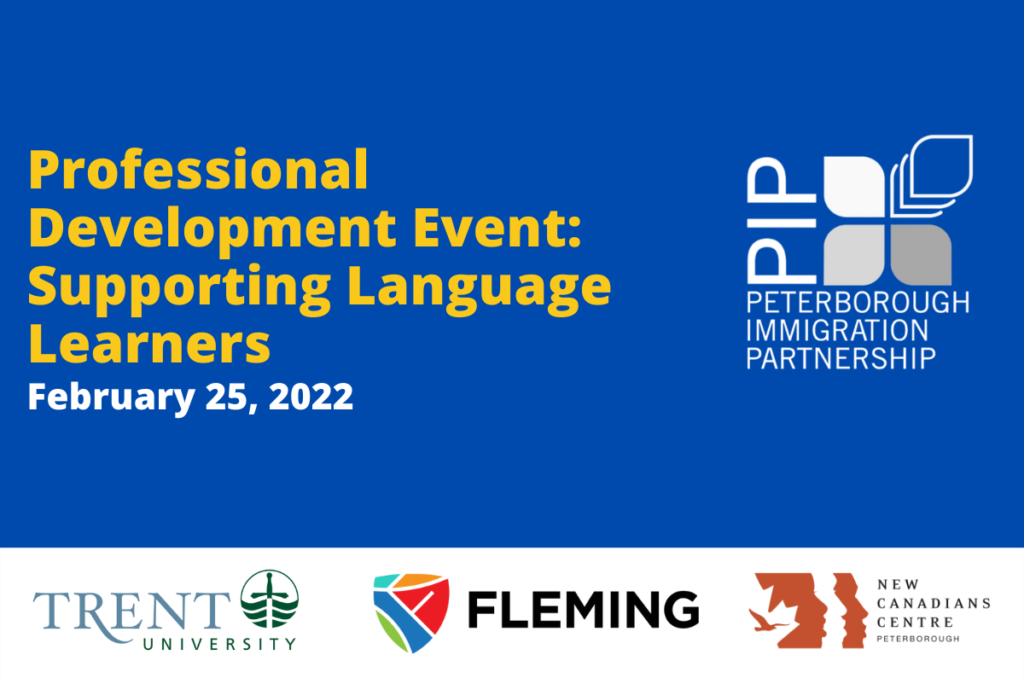Peterborough Immigration Partnership hosts PD Day on Supporting Language Learners

The Peterborough Immigration Partnership through a collaboration between Trent University, Fleming College, and the New Canadians Centre offered its annual Professional Development Day on Friday, February 25. The day brings together volunteers and professionals who teach and support multilingual learners for a day of networking and learning new skills.
This year’s PD Day featured four sessions covering a range of topics from tech and hybrid model courses to intercultural competence and infusing Indigenous knowledge and history into curricula.
Session 1: Language Learning Apps
Presenters: Julia Beddoe and Larissa Conley, Conestoga College Institute of Technology and Advanced Learning
The workshop runs through 15 apps and activities using a colourful Jeopardy-style board. The five categories include Low(er) Tech, Get Up Outta Your Seat, APPetizers, Straight to the (Power) Point, and Leftovers. The apps are all accessed easily by clicking on links through the chatbox, and participants will get a chance to experience them hands-on.
Teachers and tutors working one-on-one with students can adapt many of the tools to suit their needs. Teachers who prefer lower-tech options will also be able to find something they can use. The first category of activities includes engaging options using only the Zoom microphone and camera. People teaching online and in-person will all be able to find something they can use.
Here is a shared document with a summary of each activity, the possible uses, and the important links.
Session 2: Listening and Speaking in Hybrid Courses: Strategies for Learning and Assessment
Presenter: Dr. Leanne Johnny, Algonquin College
With the end of the coronavirus pandemic on the horizon, educational institutions across Canada have been reopening physical learning spaces and gradually bringing students back into classrooms, at least for some portion of their courses. This partial reentry means that, for the foreseeable future, many instructors will be tasked with using hybrid models of education that provide students with both in-class and virtual learning opportunities. This presentation will explore strategies for implementing this hybrid model within the context of language learning with a particular focus on listening and speaking skills. For instance, what speaking activities are best suited to in-person learning given the new reality of masks and social distancing? Moreover, are there some tasks and assessments that we can do better in virtual environments? Drawing upon recent research in the field of language learning, this presentation will make recommendations to help instructors maximize the benefits of different modes of delivery.
Session 3: Developing Intercultural Competence in the Virtual Classroom
Presenter: Dr. Paramita Dutta, OCELT, Gary Allan Learning Centre for Adult & Continuing Education, Halton District School Board
What is intercultural competence and why is it important, especially in the ESL classroom? Why is “intercultural literacy” described as an essential skill by UNESCO today? What is the relationship between good/effective ESL teaching and developing an interculturally competent classroom?
This presentation will begin with a theoretical framework conceptualizing “intercultural competence” and establish the principal characteristics that constitute it as per scholars such as Darla Deardoff and organizations such as UNESCO. It will deal with the challenges and how to overcome them in building intercultural competence in the virtual classroom for an effective classroom dialogue to take place.
You will learn: how to develop an interculturally competent ESL classroom in the current pandemic scenario when teaching is remote and online and videoconferencing has a culture of its own, the challenges/barriers in creating an interculturally effective virtual classroom, and ways to circumvent these challenges/barriers.
Session 4: Kichi-Asotamatowin: Land & Treaties English as an Additional Language Curriculum for adults
Presenters: Adrianne Breyfogle, Immigration Partnership Winnipeg, Dina Demburg, Enhanced English Skills for Employment, Diana Ishigaki
In response to the Truth and Reconciliation Call to Action #93, Immigration Partnership Winnipeg and its partners are developing a larger project, called the Indigenous Orientation Toolkit (IOTK). This English as an Additional Language curriculum is one part of that project and its goal is to provide newcomers with information on Indigenous history and culture, customs and beliefs, and contemporary issues faced by Indigenous peoples.
The curriculum is intended to assist teachers in introducing newcomers to the foundational history of Indigenous nations and their historical and contemporary contributions to the development of Canada. The exploration is centred on First Nations’ and Metis peoples’ perspectives on land and Treaties. When combined with leadership, teaching, and self exploration, the activities are intended to support personal growth and solidarity, and help newcomers contribute to community reconciliation efforts.
Although the curriculum was designed with a Manitoba-specific focus, we hope that it may also prove to be a useful resource for language programs in regions across Turtle Island.
